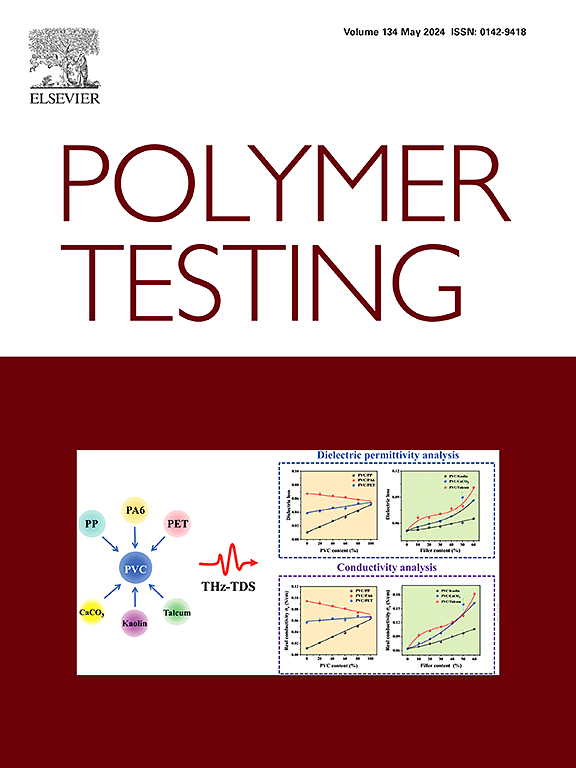豌豆分离蛋白-海藻酸盐生物复合膜:石榴花提取物增强性能
IF 6
2区 材料科学
Q1 MATERIALS SCIENCE, CHARACTERIZATION & TESTING
引用次数: 0
摘要
本研究旨在制备一种以豌豆分离蛋白(PPI)-海藻酸盐为基础的新型复合膜,该膜含有石榴花提取物(PFE)。不同PPI与海藻酸盐的比例(1:1,1:3和1:5)和PFE浓度(0%,5%和10% v/v)对生物复合膜的影响。FTIR和DSC分析显示,随着蛋白质含量的增加和PFE浓度的降低,分子相互作用和热稳定性增强。XRD结果表明,蛋白质含量越高,提取物浓度越低,膜的结晶度越高。FESEM图像显示,在没有提取物的情况下,高蛋白质含量的薄膜结构光滑紧凑,从而提高了拉伸强度、弹性模量和接触角。与含有10% PFE、蛋白质与海藻酸盐比例为1:1的膜相比,含有0 PFE、蛋白质与海藻酸盐比例为1:5的膜的功能性能分别下降了56.58%、46.71%、60.21%、54.54%和58.67%,包括水蒸气和氧气渗透性、水溶性、含水量和溶胀率。增加蛋白质含量和提取物浓度可提高膜的不透明度和抗氧化活性,但降低生物降解率,尽管所有膜在60天内降解率均超过75%。含10%提取物的膜具有最高的抗菌活性和总酚含量。释放研究表明,提取物在水模拟物和脂肪模拟物中分别有控制的快速和缓慢释放。所研制的活性生物复合膜在医药、化妆品、制药、食品等领域具有巨大的应用潜力。本文章由计算机程序翻译,如有差异,请以英文原文为准。
Pea protein isolate-alginates bio-composite Film: Enhancing performance with pomegranate flower extract
The present study aimed to develop a novel composite film based on pea protein isolate (PPI)-alginate containing pomegranate flower extract (PFE). The effects of various PPI to alginate ratios (1:1, 1:3, and 1:5) and PFE concentrations (0 %, 5 %, and 10 % v/v) on the on the bio-composite films. FTIR and DSC analyses revealed molecular interactions and enhanced thermal stability with increased protein content and decreased PFE concentration. XRD results indicated higher crystallinity in films with higher protein content and lower extract concentration. FESEM images displayed smooth and compact structures in films with high protein content without extract, resulting in increased tensile strength, elastic modulus, and contact angle. Functional properties, including water vapor and oxygen permeability, water solubility, moisture content, and swelling ratio, decreased by 56.58 %, 46.71 %, 60.21 %, 54.54 %, and 58.67 %, respectively, in films with a 1:5 protein to alginate ratio containing 0 % PFE compared to films with a 1:1 ratio containing 10 % PFE. Increased protein content and extract concentration enhanced opacity and antioxidant activity but reduced biodegradability rate, although all films degraded by over 75 % within 60 days. Films containing 10 % extract exhibited the highest antimicrobial activity and total phenolic content. Release studies demonstrated controlled rapid and slow release of the extract in aqueous and fatty simulants, respectively. The developed active bio-composite film shows significant potential for applications in medicine, cosmetics, pharmaceuticals, and food industries.
求助全文
通过发布文献求助,成功后即可免费获取论文全文。
去求助
来源期刊

Polymer Testing
工程技术-材料科学:表征与测试
CiteScore
10.70
自引率
5.90%
发文量
328
审稿时长
44 days
期刊介绍:
Polymer Testing focuses on the testing, analysis and characterization of polymer materials, including both synthetic and natural or biobased polymers. Novel testing methods and the testing of novel polymeric materials in bulk, solution and dispersion is covered. In addition, we welcome the submission of the testing of polymeric materials for a wide range of applications and industrial products as well as nanoscale characterization.
The scope includes but is not limited to the following main topics:
Novel testing methods and Chemical analysis
• mechanical, thermal, electrical, chemical, imaging, spectroscopy, scattering and rheology
Physical properties and behaviour of novel polymer systems
• nanoscale properties, morphology, transport properties
Degradation and recycling of polymeric materials when combined with novel testing or characterization methods
• degradation, biodegradation, ageing and fire retardancy
Modelling and Simulation work will be only considered when it is linked to new or previously published experimental results.
 求助内容:
求助内容: 应助结果提醒方式:
应助结果提醒方式:


